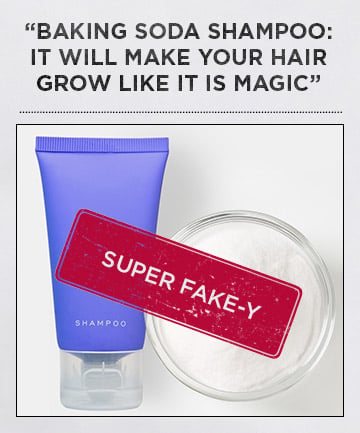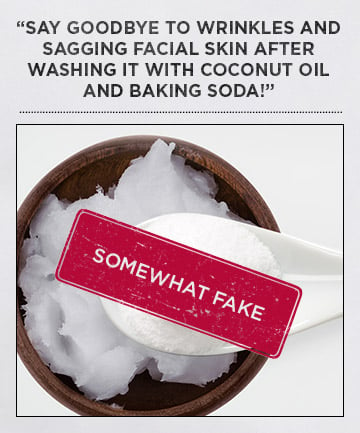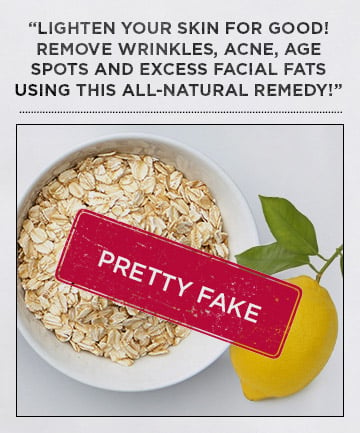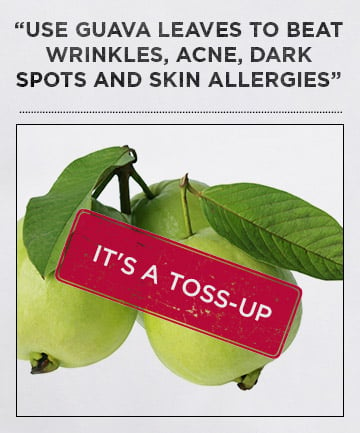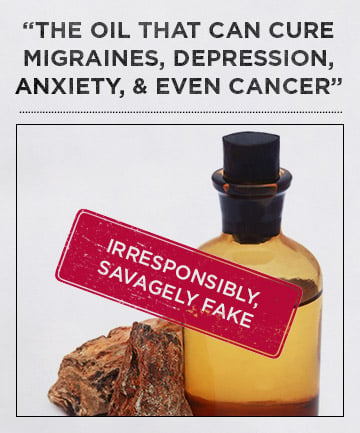The claim: This news story on dailyhealthkeeper.com claims that washing hair with a simple paste of baking soda and water has an array of benefits including preventing hair loss, boosting hair growth, and eliminating hair of "toxins" and product build-up.
Shared: 129.8K times
Fake or fact: Super fake-y
Why: Washing your hair with a baking soda paste certainly can help soak up hair-product residue or an extra-greasy scalp, as the article's author suggests. But the idea that baking soda will help hair grow faster or prevent hair fallout? That's bunk.
"Sorry to report that a baking soda shampoo will not influence the growth cycle magically," says Cunnane-Phillips. "Optimal nutrition, balanced hormones and stress management are some of the multitude of factors that will help to ensure that you are growing your best head of hair. Shampoo should function as a cleanser for the scalp and hair, but to suggest that baking soda and water will influence the growth cycle is simply not accurate."
"Baking soda will only clean your scalp and ends from buildup," Hazan agrees. "Hair growth is internal."
To promote healthier hair growth, Hazan suggests taking vitamins or eating a more balanced diet.
Image via Getty
Shared: 129.8K times
Fake or fact: Super fake-y
Why: Washing your hair with a baking soda paste certainly can help soak up hair-product residue or an extra-greasy scalp, as the article's author suggests. But the idea that baking soda will help hair grow faster or prevent hair fallout? That's bunk.
"Sorry to report that a baking soda shampoo will not influence the growth cycle magically," says Cunnane-Phillips. "Optimal nutrition, balanced hormones and stress management are some of the multitude of factors that will help to ensure that you are growing your best head of hair. Shampoo should function as a cleanser for the scalp and hair, but to suggest that baking soda and water will influence the growth cycle is simply not accurate."
"Baking soda will only clean your scalp and ends from buildup," Hazan agrees. "Hair growth is internal."
To promote healthier hair growth, Hazan suggests taking vitamins or eating a more balanced diet.
Image via Getty
Shared: 27.1K times
Fake or fact: Somewhat fake
Why: Dr. Francesca Fusco, dermatologist at Wexler Dermatology in NYC, gives a generous interpretation of this wrinkle remedy. "This formulation can indeed diminish the appearance of wrinkles on skin," she says. "The baking soda is a gentle and effective exfoliant which removes dead skin, plumps it up, and allows the coconut oil to penetrate deeply. The coconut oil plumps up the skin, reducing the appearance of fine lines."
Dr. Howard Sobel, dermatologist and founder of DDF Skincare, says baking soda is an effective but very harsh remedy for problem skin. "Soda can indeed help dry out oily skin and cleanse some blackheads," he says. "It can also be extremely drying and irritating if used too often. If one wants to try this method, I would caution using only once or twice a week."
Re: your "saggy" mug, don't expect this DIY concoction to tighten it -- that part is completely fake.
Image via Getty
Shared: 15.7K times
Fake or fact: Pretty fake
Why: The ingredients in this mask have some efficacy, says Dr. Patricia Wexler of Wexler Dermatology. "Oatmeal contains saponins, a cleansing agent," she explains. "This gives the oatmeal a large role in exfoliation and absorption of excess oil on the skin, and absorption of dirt and debris deep within the pores." Lemon juice is a natural skin lightener, adds Wexler. Together, she says, these ingredients can "address spots, freckles, and post-inflammatory hyperpigmentation."
Although these two ingredients are effective in fighting certain skin issues, they're unlikely to completely eliminate them, like the article claims. They're also very likely to irritate skin, possibly doing more harm than good.
"Oatmeal can be used to exfoliate the skin, but can be irritating and drying if used too often," says Sobel. Not to mention applying lemon juice to skin can also make it more sensitive to the sun, leading to burns.
And the notion that lemon juice and oatmeal can burn facial fat? Well, it's utter hogwash.
Image via Getty
The claim: This inscrutable guide from a site called pinoyhealthguide.com discusses the miracle that is the guava leaf, which the author claims can erase wrinkles, pimples and hyperpigmentation and calm inflammation from atopic dermatitis.
Shared: 60.9K times
Fake or fact: It's a toss-up
Why: Wexler defends some of this article's claims. "It is a fact that the leaf of the guava fruit has more antioxidant properties than the fruit itself," says Wexler. "It is extremely high in lycopene, and vitamin C, which is responsible for stimulation of collagen, protection against UV damage, and anti-inflammatory properties." She says guava leaves are also an "effective antibacterial" treatment for acne and possess "anti-allergic properties" to fight atopic dermatitis.
Sobel is more cautious, citing the lack of published evidence for the effectiveness of such a home remedy. "Guava leaves may have some properties to exfoliate or help with irritation, but there are no studies to show this method can extract enough of it to be effective," he says.
Image via Getty
Shared: 60.9K times
Fake or fact: It's a toss-up
Why: Wexler defends some of this article's claims. "It is a fact that the leaf of the guava fruit has more antioxidant properties than the fruit itself," says Wexler. "It is extremely high in lycopene, and vitamin C, which is responsible for stimulation of collagen, protection against UV damage, and anti-inflammatory properties." She says guava leaves are also an "effective antibacterial" treatment for acne and possess "anti-allergic properties" to fight atopic dermatitis.
Sobel is more cautious, citing the lack of published evidence for the effectiveness of such a home remedy. "Guava leaves may have some properties to exfoliate or help with irritation, but there are no studies to show this method can extract enough of it to be effective," he says.
Image via Getty
The claim: This article from realfarmacy.com positions humble frankincense oil as a universal cure-all. The writer explains the oil is effective in healing minor wounds and pimples, "balancing the emotions," reducing stress, strengthening the immune system, relieving anxiety, and even removing moles.
Shared: 136.4K times
Fake or fact: Irresponsibly, savagely fake
Why: Dr. Scott Caroll, a psychiatrist who specializes in psychosomatic medicine at the Ayni Neuroscience Institute in Albuquerque, New Mexico, calls this news story "an excellent example of borderline hucksterism." He notes that although it is "legal to make claims about 'supporting the health of (insert organ system)' without citing any research or scientific evidence ... such claims are vague and meaningless from a medical and scientific prospective."
Carroll is careful not to knock alternative medicine as a whole, noting that he has used ingredients like frankincense oil and peppermint oil in his household. "The real problem is when people cite these completely nonscientific claims and refuse medical treatments where I can scientifically state the odds of success and the risks of side effects," he says.
"The claim doesn't specify the effectiveness of the ingredient, and there is little research proving such a claim," confirms Dr. Jared Heathman, a psychiatrist based in Houston, Texas. "The actual oil may not be beneficial at all."
Strangely, the article makes no mention of the headline's sensational promise that frankincense will "cure" migraines, depression or cancer. This is probably for the best, since no such evidence exists.
Image via Getty
Shared: 136.4K times
Fake or fact: Irresponsibly, savagely fake
Why: Dr. Scott Caroll, a psychiatrist who specializes in psychosomatic medicine at the Ayni Neuroscience Institute in Albuquerque, New Mexico, calls this news story "an excellent example of borderline hucksterism." He notes that although it is "legal to make claims about 'supporting the health of (insert organ system)' without citing any research or scientific evidence ... such claims are vague and meaningless from a medical and scientific prospective."
Carroll is careful not to knock alternative medicine as a whole, noting that he has used ingredients like frankincense oil and peppermint oil in his household. "The real problem is when people cite these completely nonscientific claims and refuse medical treatments where I can scientifically state the odds of success and the risks of side effects," he says.
"The claim doesn't specify the effectiveness of the ingredient, and there is little research proving such a claim," confirms Dr. Jared Heathman, a psychiatrist based in Houston, Texas. "The actual oil may not be beneficial at all."
Strangely, the article makes no mention of the headline's sensational promise that frankincense will "cure" migraines, depression or cancer. This is probably for the best, since no such evidence exists.
Image via Getty


